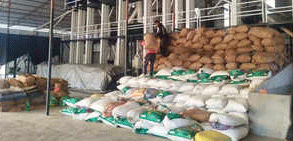Aeroponics: A Game-Changer for Potato Seed Production in Mizoram
The Launch of Aeroponic Technology
On Thursday, Mizoram’s Agriculture & Farmers’ Welfare Minister, PC Vanlalruata, inaugurated the state’s first aeroponic potato seed production system at the agriculture farm in Thingdawl, Kolasib district. This innovative project, fully funded by the North Eastern Council (NEC), aims to tackle the state’s reliance on imported potato seeds, which currently makes up 90% of consumption.
According to Samuel Lalliansanga, Deputy Director of the Agriculture Department, the project aims to produce 2.5 lakh mini tubers per season, doubling to 5 lakh mini tubers annually if biannual production is maintained.
Understanding Aeroponic Seed Production
Aeroponic farming is a soil-less cultivation system where plant roots hang in the air and are nourished by a nutrient-rich mist. For potatoes, this method involves the following steps:
- Tissue Culture: Potato plants are processed in a lab to ensure disease-free propagation.
- Aeroponic Unit Transfer: The plants are then grown in an aeroponic environment, where the roots remain suspended and are regularly sprayed with water and nutrients.
This approach offers multiple advantages:
- Higher Yield in Limited Space: Ideal for regions with limited arable land.
- Disease-Free Seeds: Controlled conditions reduce exposure to pathogens.
- Efficient Resource Use: Minimal soil and optimized nutrient delivery.
Economic and Agricultural Impact
The Rs. 198 lakh project implemented by Blue Stallion Equipment (P) Ltd., Ludhiana, is a pivotal step for Mizoram’s agriculture sector. It is expected to:
- Reduce Dependency: Local farmers can access high-quality seeds within the state.
- Cost Savings: Farmers save on importing seeds from other states, reducing transportation and procurement costs.
- Boost Production: High-yield seeds could significantly increase potato cultivation and contribute to local food security.
If successful, this project could inspire similar initiatives in other states facing seed shortages and dependency on imports.
Challenges and the Road Ahead
While promising, the project must address:
- Scalability: Ensuring consistent production to meet the state’s demand.
- Farmer Training: Educating farmers on using aeroponic seeds effectively.
- Sustainability: Maintaining operational efficiency and funding for long-term success.
Collaborations between the government, private sector, and local farmers will be crucial to ensure the initiative’s viability and widespread adoption.
The introduction of aeroponic seed production in Mizoram marks a significant step toward self-sufficiency in potato farming. By leveraging advanced technology, the state can empower its farmers, enhance yields, and reduce dependence on external markets. This innovative approach highlights the potential of modern agriculture to address traditional challenges, paving the way for a more resilient farming community.







